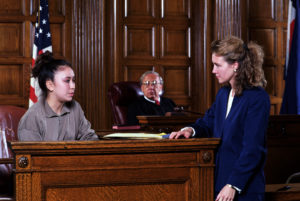
Choosing the Type of Trial
What you can expect at your trial depends, to some extent, on the type of trial you decide to have. The Constitution of the United States guarantees you the right to a trial by a jury of your peers; however, you also have the right to waive that right and try your case in front of a judge instead. Referred to as a “trial by judge” or a “bench trial,” this type of trial eliminates the jury and allows the judge to decide the issue of guilt. There are a number of strategic reasons why you might prefer to waive your right to a trial by jury and proceed to a bench trial. One of the most common reasons is in a situation where your attorney believes a jury of your peers is impossible to convene. Clearly, if you decide to go the bench trial route, there is no need to pick a jury. Instead, you case will proceed straight to the trial.
Voir Dire – Picking a Jury
If you decide to exercise your right to a trial by jury, the first thing to happen on the day of trial will be picking the jury. The legal name for this process is “voir dire.” Potential jurors for the jury pool will have been randomly summoned by the clerk based on the list of registered voters or license holders in your area. An initial group will enter the courtroom at which point both the prosecuting attorney and your attorney will have the opportunity to ask them questions. Each side may challenge potential jurors for cause or using a peremptory challenge. For cause means that there is a legal reason, such as bias, why the potential juror cannot serve on the final jury. Each side I also given a set number of peremptory challenges. These can be used to excuse a potential juror for any reason except for discriminatory reasons. Once both sides have exhausted their challenges, the people left make up the final jury and the trial actually begins.
Opening Statements
Both the prosecuting attorney and your attorney will give an opening statement at the beginning of the trial. Because the State has the burden of proving the defendant guilty beyond a reasonable doubt, the State always presents its case first. Therefore, the prosecutor will give his/her opening statement first as well. The opening statement is intended to give the jury (or judge) a preview of the case that side intends to present. Think of it as a book preview or a “trailer” for a movie.
The State’s Case
The next step is the State’s case. The prosecuting attorney will call witnesses for the State and question those witnesses. This is referred to as “direct” examination. The prosecuting attorney will also enter evidence into the record through witnesses during this phase of the trial. Your attorney can also ask questions of each State’s witness. This is referred to as “cross-examination.”
The Defendant’s Case
When the State “rests,” or finishes will all its witnesses, the defense has the option to present a defense. In our criminal justice system, the defendant is not required to present any testimony or evidence. If the defense does decide to put on witnesses, that will happen next with the defendant’s attorney conducting the direct examination and the prosecuting attorney the cross-examination.
Closing Statements and Jury Deliberation
After the defense rests, and any rebuttal witnesses have been called, both sides will present a closing statement. This allows both attorneys to emphasize the strength of their case or defense one last time before the case goes to the jury (or judge). The judge then reads the jury instructions and the jury files out to deliberate at a jury trial. If it is a bench trial, the judge will render a verdict at this point. The jury must reach a unanimous verdict in order to find you guilty. Once a verdict has been reached the jury will return to the courtroom for the verdict to be read. If the verdict is “guilty,” the judge may proceed to sentencing or may delay sentencing in order to give both sides an opportunity to prepare.
How Can a Smyrna Criminal Lawyer Help?
Although this provides a rough overview of what to expect at a trial, the unique nature of a criminal prosecution makes it impossible to provide details about your trial. If you have specific question about what will likely happen at your trial, consult with your Smyrna criminal lawyer.
Contact Us
If you have been charged with a crime in the State of Tennessee, it is in your best interest to consult with an experienced Smyrna criminal lawyer at Bennett, Michael & Hornsby as soon as possible so your attorney can start minimizing the damage. Contact the team today by calling 615-898-1560 to schedule your appointment.
- Understanding the Role and Responsibilities of a Trustee - April 23, 2024
- When Are Miranda Warnings Required? - April 16, 2024
- 5 Benefits of Mediation in a Tennessee Divorce - April 9, 2024







